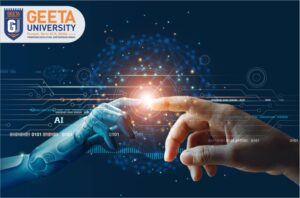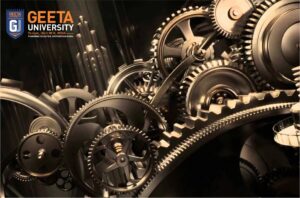Pradhan Mantri Ujjwala Yojana (PMUY)
UncategorizedPradhan Mantri Ujjwala Yojana (PMUY)
- October 7, 2024
- Geeta University
Ujjwala Yojana aim to supplying clean cooking fuel to households who fall below the poverty line in order to promote health, gender equality, and economic development. Furthermore, this curriculum advocates for a healthy society and the empowerment of women. In the end, switching to greener fuel might leave our future generations with a clean environment. This study examines the ways in which PMUY has impacted Indian society, focusing specifically on the ways in which it has promoted social inclusion. Using official records, academic studies, and field data, this study explores how PMUY has enhanced the quality of life for beneficiaries, empowered women, reduced indoor air pollution, and stimulated economic activity. The findings highlight PMUY’s role as social change agent and offer policy recommendations. In order to grant women their rights, especially the right to clean energy and a life free from drudgery, smoking, and poor health, the Pradhan Mantri Ujjwala Yojana was launched. Millions of women’s lives across the country have been progressively and profoundly changed by the program since its start. According to estimates from the World Health Organization, indoor air pollution ranks second in India’s causes of mortality behind high blood pressure, with over 5 lakh fatalities occurring there each year. By utilizing LPG. The Pradhan Mantri Ujjwala Yojana (PMUY) was started with the intention of enhancing the lives of Indian women by protecting them from this hard labor. The “Pradhan Mantri Ujjwala Yojana,” a large action plan created by the government, is to provide free LPG connections to 5 crore BPL houses over a three-year period beginning on April 1, 2016. 2.20 crore LPG connections were provided to BPL families in 2016–17 alone (News report 07 May 2017). Deposit-free LPG connections are available to women from BPL families who are facing at least one deprivation under SECC-2011, according to the campaign. Thanks to the Ujjwala Yojana, low-income people will now be able to afford to convert from solid fuel to cleaner alternatives. Cooking is one of the jobs that take up much of a woman’s day in India. Rural women in India rarely have time for anything other than these errands and are rarely able to complete any meaningful work. According to the 2011 Census, almost 121 million Indian households continue to cook their food using conventional fuels. Forty percent of Indian households still do not have access to clean energy for cooking. Given these circumstances, Prime Minister Narendra Modi initiated this effort, 80 million Indian rural women from low-income families would have access to liquefied petroleum gas (LPG), a clean energy source.
Development Policies
Sustainable development must prioritize social inclusion, especially in a nation as diverse and populated as India. It is imperative to implement inclusive development strategies in order to mitigate disparities, foster social harmony, and guarantee that the advantages of economic expansion are distributed to every aspect of the community. Inclusive policies have the potential to break the cycle of poverty and enhance overall quality of life by focusing on vulnerable populations and meeting their unique needs. In addition to addressing urgent health and environmental issues, granting access to clean cooking fuel is a step toward greater social participation.The program aims to improve underprivileged communities, especially women who bear the brunt of the health risks associated with traditional fuels and are frequently in charge of cooking in the home. Through providing these women with greener energy options, PMUY contributes to the larger objectives of economic growth and gender parity. By providing them with clean cooking fuel and avoiding the need for them to work in smoky kitchens, the Pradhan Mantri Ujjwala Yojana (PMUY) aims to safeguard the health of women and children The large initial financial commitment was one of the drawbacks of long-term LPG use. The Government of India (GoI) provided the beneficiaries with cash assistance worth Rs. 1,600 per connection in order to lessen this restriction. The cost of an LPG hose, cylinder, pressure regulator, consumer card, and installation fees were covered by this help. The beneficiaries also had the option to apply for a loan to cover the cost of the stove’s initial refill. An aggregate of 6.24 Cr. households (78%) made use of the financing facility.
Details of Cash Assistance provided per connection released under the scheme
Item 14.2 Kg Cylinder (Rs.) 5 Kg Cylinder (Rs.)
Security Deposit of Cylinder 1,250.00 800.00
Security Deposit of PR (Pressure Regulator) 150.00 150.00
LPG House 25 100.00
Domestic Gas Consumer Card (DGCC) 75.00 25.00
Installation Charges 75.00 75.00
TOTAL 1,600.00 1,150.00
Cooking using LPG fuel requires standard LPG equipment, such as a gas burner, rubber pipe, LPG cylinder, and pressure regulator. Oil Companies’ LPG distributors provide standardized LPG equipment to customers who accept LPG connections in exchange for a portion of the equipment’s cost. In order to supply the BPL household with an LPG connection under the designated scheme, the Central Government is covering the Oil Company’s cylinder and pressure regulator (1400+200) expenditures. The BPL family also has the option of purchasing the less expensive gas stove and refill or paying in installments for the initial refill.The Oil Company provides rapid refills and inexpensive gas burners through a distribution network if you decide to use EMI. In this case, the BPL household will receive reimbursement from the LPG subsidies at the time of the next filling for the inexpensive gas stove and initial refill charges of Rs. 1620 (i.e., Rs 630 + Rs. 990). Repaying the original gas stove purchase price plus one free refill via EMI will take eight to nine months with the current LPG subsidy of roughly Rs. 200 per cylinder refill. An additional individual or organization can contribute to this social cause by helping to cover the cost of a gas stove and refill in conjunction with oil firms. Affordability is one of the main barriers keeping homes from converting from solid fuels to cleaner fuels. The underprivileged cannot afford the increased cost of an LPG connection or cleaner fuel. It is a good social gesture to provide families in the BPL with free LPG connections. The national government has allocated Rs. 8000 crores over three years for the scheme’s implementation. Without a doubt, because they perform so many tasks on a daily basis, women are the backbone of every society, and the money saved from the subsidies is being utilized for the “give it up” campaign. Rural women who obtained LPG connections under PMUJ in order to cook at home make up the study’s sample unit. These women are from six Taluks and eight villages. The antithesis of social exclusion is social inclusion. Socially excluded people, or groups of people, do not fully engage in the political, social, and economic life of the country. This weakens social cohesion, heightens interpersonal conflict, and impedes the nation’s economic progress. Individuals are born into a complex network of social and economic classes that shape their behavior, thought processes, and wealth endowment. Because of these situations, behaviors, or alienations, some individuals or groups of individuals stayed apart from society’s mainstream and gradually descended into poverty and social injustice. The process of bringing about reforms or changes in policy to lessen disparities in access to opportunities, resources, and competencies is known as social inclusion. It involves making accommodations and providing incentives to marginalized or socially excluded groups so they can become empowered and build their potential to actively contribute to the social and economic growth of the nation. The government places a specific emphasis on giving marginalized and weaker segments of society opportunities and support for their social and economic development as part of the social inclusion process. According to the World Bank, social inclusion is the process of enhancing the capacity, opportunities, and dignity of individuals who are marginalized in society due to their identity (World Bank, 2013). Following six decades of independence, a significant portion of the population has been socially included, including scheduled castes, scheduled tribes, religious minorities, Women, children, and people with disabilities have not kept up with the socioeconomic development process. Many people in India continue to live below the poverty line (BPL) as a result of this population group not benefiting evenly from state policies and spending during the past six decades. Put another way, it may be claimed that these BPL households have benefited from economic prosperity whilst continuing to be socially marginalized. Many initiatives have been undertaken to integrate these families into the mainstream by providing unique and incidental benefits through government programs such as the Scheduled Tribes Tribal Sub Plan (TSP) and the Special Component Plan for Scheduled Castes (SCP of SCs). The Prime Minister’s 15-point plan for gender-responsive budgeting and minorities. The National Democratic Alliance (NDA) government has implemented several social security initiatives aimed at improving the lives of the impoverished and marginalized population. Air pollution is a contributing factor to lung cancer, heart disease, stroke, chronic obstructive pulmonary disorders, and other respiratory problems. Through PMUY, BPL households are encouraged to utilize cleaner fuel, preventing illness and strengthening the social fabric in the process. It is imperative for all future generations to have access to a clean environment. We are overusing the planet’s finite natural resources and putting dangerous contaminants in the air and water. Water sources like rivers and ponds are drying up, the ecology is collapsing, and many things are becoming extinct. Air pollution is caused by burning solid fuel or biofuel for cooking, in addition to emissions from industry and automobiles. Providing cleaner fuel, like LPG, to rural BPL families is one of the best strategies to minimize air pollution. In order to guarantee that the environment in our nation is clean, the Swatch Bharat initiative is also actively being pushed. The government has had difficulties in putting the PMUY initiative into practice. The lack of reliable data to identify low-income homes makes it difficult at first to decide to whom to assign an LPG connection. The SECC-2011 data was utilized by the government to determine who was eligible for a PMUY connection. Once it was discovered that a number of wealthy homes in the SECC-2011 data were classified as BPL households, it became very difficult to verify the accuracy of all the information in the SECC database. The government encountered many challenges as a result of the general lack of awareness regarding the safety measures that need to be followed while using an LPG stove for cooking. The majority of the impoverished lack both an Aadhar card and a ration card.
Conclusion
A big step in the direction of the underprivileged’s social inclusion is the PMUY. The ease of use and speed of LPG cooking means that the women no longer have to spend arduous time gathering and using dirty fuel for cooking, giving them more time for other pursuits. Other household financial decisions, such as placing LPG refill orders and keeping an eye on bank account balances to be eligible for subsidies, are also decided by the women. The improved environment, healthier society, and less air pollution benefit the entire country. The government is encouraging the adoption of cleaner fuel by providing one-time aid to BPL households.

Dr.Santosh Kumar (Post Doc)

Admission Open 2024-2025
For Your bright Future
Tags
Related Posts

What is Data Security? | Why is Data Security important? | Types of Data Protection – Geeta University
For a variety of reasons, data security is critical for both public and commercial enterprises. First, there is the legal and ethical obligation of companies to protect their user and customer data from falling into the wrong hands. What is

Artificial Intelligence: AI Terms Simply Explained – Geeta University
Unlike humans, AI learns and excels at a limited number of tasks. Weak or thin AI is the name given to such associate AI. They are currently typically superior to humans in their field. Artificial intelligence: AI Terms Simply Explained

Career in Mechanical Engineering – Scope, Courses – Geeta University
Career in Mechanical Engineering- Are you dreaming of making a career in Mechanical Engineering? Do you want this information that how to become Mechanical Engineer. Career in Mechanical Engineering – Scope, Courses Scope of Mechanical Engineering Career in Mechanical Engineering-
